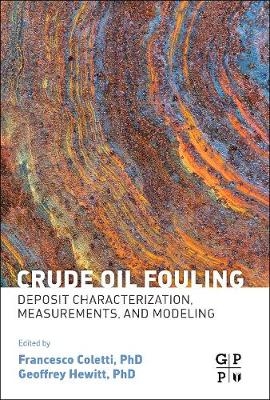
Crude Oil Fouling
Gulf Professional Publishing (Verlag)
978-0-12-801256-7 (ISBN)
Crude Oil Fouling is a must-have reference for every petroleum engineer’s library that gives the basic framework needed to analyze, model, and integrate the best fouling strategies and operations for crude oil systems.
Francesco is a co-founder of Hexxcell Ltd., a spin-off company from Imperial College London operating in the area of heat transfer and energy efficiency, where he serves as a Director and Chief Technology Officer. Prior to Hexxcell, Francesco worked at Praxair, Inc., a Fortune 500 company, in Buffalo, NY where he focused on the mathematical optimisation of cryogenic multi-stream heat exchangers and air separation units. Francesco’s scientific interests lie at the intersection of the two exciting fields of Heat Transfer and Process Systems Engineering with focus on modelling, optimsation, and heat integration of energy systems. In these areas, he has co-authored several articles published in international journals and refereed conference porceedings. Since October 2013, he has been appointed Executive Editor of Heat Exchanger Design Handbook (HEDH). Francesco is also serving as Industry Engagement Manager for the UNIHEAT project, a large international research collaboration between Imperial College London and Boreskov Institute of Catalysis in Russia, sponsored by Skolkovo Foundation and BP. He holds a Laurea in Chemical Engineering from the University of Padova, Italy, an MSc in Process Systems Engineering and a PhD from Imperial College London. His PhD thesis “Multi-scale Modelling of Refinery Pre-heat Trains Undergoing Fouling for Improved Energy Efficiency was awarded the 2010 Newitt prize for Theoretical and Computational Excellence by the Department of Chemical Engineering at Imperial College London. Professor Hewitt is an Emeritus Professor of Chemical Engineering at Imperial College London. Professor Hewitt has worked on a variety of subjects in the general field of chemical engineering but his speciality for several decades now has been in mutliphase flow systems, with particular reference to channel flow and heat transfer. He has published many papers and books in this industrially important area and has lectured on the subject widely throughout the world. He has had a wide experience of industrial application through extensive consultancy and contract work and through his founding of the Heat Transfer and Fluid Flow Service (HTFS) at Harwell and Hexxcell Ltd., a spin-out of Imperial College London operating in the area of heat transfer and energy efficiency. Professor Hewitt's contributions to the field have been recognised by his election to the Royal Academy of Engineering (1985), the Royal Society (1990), and the US National Academy of Engineering (1998) in addition to several international awards including Donald Q. Kern Award by AIChE (1981), Max Jakob Award by ASME (1995), and the Luikov Medal by ICHMT (1997). In 2007, he was presented the Global Energy Prize by Vladimir Putin at the World Economic Forum.
List of Contributors Preface ix Nomenclature
1. Introduction 1.1 Crude Distillation Units in Oil Refineries 1.2 Impact of Fouling on Crude Distillation Units 1.3 Concluding Remarks
2. Basic Science of the Fouling Process 2.1 Fouling Mechanisms 2.2 Routes to Crude Oil Fouling Formation 2.3 Events in Crude Oil Fouling 2.4 Variables Affecting Fouling 2.5 Conclusions
3. Experimental Generation of Fouling Deposits 3.1 Small Scale, Accelerated Conditions: Microbomb Fouling Tests 3.2 Batch System: Stirred Cell at the University of Bath 3.3 Large-Scale Experiments in Flow Systems
4. Deposit Characterization and Measurements 4.1 Analysis of Field Fouling Deposits from Crude Heat Exchangers 4.2 Chemical Structure and Molecular Weight Characterization 4.3 Chemical Imaging of Deposited Foulants and Asphaltenes 4.4 Fluid Dynamic Gauging: Thickness and Strength Measurements
5. Modeling of Fouling from Molecular to Plant Scale 5.1 Review of Heat Exchanger Design Methodologies and Mathematical Models of Fouling 5.2 Thermodynamic and Molecular Modeling 5.3 Fundamental Transport Modeling 5.4 Industrial Scale High-Fidelity Modeling
6. Concluding Remarks
Appendix 1 References Index
| Erscheint lt. Verlag | 9.12.2014 |
|---|---|
| Sprache | englisch |
| Maße | 152 x 229 mm |
| Gewicht | 730 g |
| Themenwelt | Technik ► Elektrotechnik / Energietechnik |
| ISBN-10 | 0-12-801256-0 / 0128012560 |
| ISBN-13 | 978-0-12-801256-7 / 9780128012567 |
| Zustand | Neuware |
| Haben Sie eine Frage zum Produkt? |
aus dem Bereich


